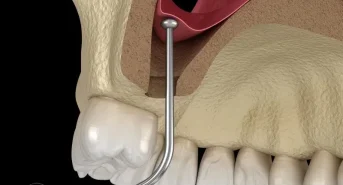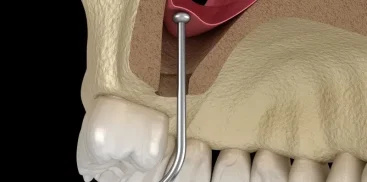Do you need root canal treatment under a microscope?
People who need root can be treated under a microscope can turn to experts from the Warsaw Dental Center. Our endodontics professionals are ready to help cure the tooth infection, stop the pain and prevent complications. Call us today to see why endodontics and the Warsaw Dental Center team are the best choice for root canal treatment.
What is endodontic treatment and what is it?
Canal treatment under a microscope is like a light in a tunnel for teeth that struggled with difficulties! When the pulp and bones around the tooth experience inflammation, which is manifested by unpleasant pain, it is endodontics that come to the aid. This is often the only chance to save a tooth that is struggling with the disease.
Root canal treatment is nothing more than a great adventure for your tooth! It consists in carefully cleaning the canals of the tooth, and then their disinfection and tight filling. This is a process full of precision and diligence, because in order for endodontics to be effective, all bacteria must be defeated. In this heroic task, specialized disinfectants and materials that do not give a chance to bacteria. Your tooth can be healthy!
-
How often should I visit my dentist to detect and treat dental problems early?
It is recommended to visit a dentist every six months. These regular checks allow for prior detection and treatment of dental problems. When visiting your dentist twice a year, you may notice potential problems in time and act avoiding the need for root canal treatment.
-
What specific steps can I take to maintain good oral hygiene?
To maintain good oral hygiene, it is recommended to brush your teeth at least twice a day using a toothbrush and paste. In addition, the use of dental floss for cleaning interdental spaces and rinsing of the mouth with rinsing helps maintain hygiene. Regular visits to the dentist every six months are also necessary for professional cleaning and early detection of dental problems.
-
What are the preventive measures for dental health?
Preventive measures for dental health include maintaining good oral hygiene habits. This means brushing your teeth twice a day, using dental floss and mouth rinse fluid. Additionally, regular checks at the dentist every six months are important to detect and address dental problems at an early stage, thus avoiding the need for root canal treatment.
-
How can I prevent tooth problems and detect them early?
To prevent problems with teeth and detect them early, it is crucial to maintain good oral hygiene. This includes brushing your teeth twice a day, using dental floss and mouth rinse fluid. In addition, regular visits to the dentist every six months allow for early detection and treatment of dental problems, potentially avoiding the need for root canal treatment.
-
What is the best way to avoid root canal treatment?
The best way to avoid root canal treatment is to take care of oral hygiene and regular visits to your dentist. This includes brushing your teeth twice a day, using dental floss and mouth rinses. Regular checks at the dentist every six months are also important to detect and treat dental problems early, thus avoiding the need for root canal treatment.
How is the canal treatment?
The process of endodontic treatment may raise many questions and concerns in patients. We are afraid of both the procedure, pain and possible complications. To dispel these doubts, we will describe the steps of root canal treatment step by step:
- After receiving information about the need for root canal treatment, the doctor takes an X-ray of the patient’s tooth to carefully assess his condition.
- Before starting the procedure, the doctor will give local anesthesia so that the patient does not feel pain.
- The procedure begins with the removal of caries from the tooth.
- Then the holes inside the tooth are made so that the doctor can reach the root canals.
- When the canals are available, the dentist proceeds to develop them, removing the remaining pulp and expanding the channels to accurately remove any pathogens.
- The next step is the disinfection of the tooth canals using special agents, such as a solution of sodium subchlorite, which destroys bacteria.
- After thorough cleaning of the canals, the doctor dehumidifies them and fills them with specialized material.
- The tooth is then tightly protected to prevent the growth of bacteria and maintain its life.
When is it worth to undergo root canal treatment?
What are the indications for root canal treatment under a microscope?
Sometimes the first indication that you need root canal treatment may be to talk to your dentist. In other cases, it is the symptoms of an infected tooth that may prompt you to make an appointment with your dentist and interest in root canal treatment.
Symptoms that may indicate the need for root canal treatment include:
– Teeth pain – A toothache lasting more than a day is often a sign that you should visit your dentist. Deep, pulsating pain that you also feel in your face, jaw, and surrounding teeth can be a signal of the need for root canal treatment.
– Pain with food – A toothache while eating or pressing on its top may be a sign of infection requiring root canal treatment.
– Swelling of the gums – If you notice that your gums look swollen or swollen, or are sensitive when touching and brushing, this may indicate an infection.
–Sensitivity to temperature – The infection can cause toothache when you eat or drink something very hot or very cold.
Your Obrzęknięta szczękajaw may swell when you have an infection in your gums.
– Krostka, called a fistula, filled with bacteria, can appear on your gums when you have an infection. This is a sign of abscess and indicates the need for root canal treatment.
– A discolored tooth – Infection can change the blood supply to the tooth, which can make the tooth look darker than usual.
– Movable tooth – The infection can weaken and soften the tooth-supporting bone, causing its movability in the gum.
-Cracking or breaking the tooth – Cracks and fractures can allow bacteria to get into the tooth and cause infection.
Contraindications of the
Endodontic treatment is not possible in the case of:
- Large decay and destruction of walls and tooth roots.
- Damage to the tooth surrounding the tooth root.
- Presences of diseases that may pose a risk to the patient. In such cases, it is necessary to consult a doctor or dentist before starting treatment.
What complications may occur after the procedure?
Endodontic treatment is a complex procedure and can lead to various complications:
- What should I do if complications after root canal treatment occur?
If complications after root canal treatment occur, it is important to immediately consult the dentist. The dentist will assess the situation and recommend appropriate measures to address the complications and alleviate the associated symptoms.
- What are the less common complications that may occur after root canal treatment?
Less common complications after root canal treatment may include breaking dental tools inside the root canal, root wall perforation, and postoperative infection.
- What additional treatments may be necessary in case of tooth hypersensitive after root canal treatment?
In some cases, additional treatments may be necessary, such as apiccotomy (the root top detection) or tooth extraction to relieve the persisting hypersensitivity of the tooth after root canal treatment.
- How can you manage pain after root canal treatment?
Pain after root can be effectively relieved with pain medication or painkillers.
- What is the most common complication after root canal treatment?
The most common complication after root canal treatment is postoperative pain, which can persist for several days or weeks.
Is root canal treatment painful?
- What should I do if the pain in my mouth after root canal treatment does not go away or worse?
If the pain in your mouth after root canal treatment persists or gets worse, this may suggest developing inflammation. In such cases, an immediate consultation with the dentist is necessary to exclude possible complications.
- How long does the pain take after root canal treatment?
Pain after root canal treatment usually resolves relatively quickly, in more complicated cases it can persist for up to a week. It is usually relieved with pain medication.
- What can be done to relieve pain during a root canal treatment?
Root canal treatment is performed under anesthesia, which helps to minimize pain. Patients usually do not feel pain during the procedure.
- Is there pain after root canal treatment?
After the canal treatment, there may be slight pain. However, this pain is usually relieved with pain medication.
- Is root canal treatment painful during the procedure?
Root canal treatment should not be painful. Anesthetics and anaesthesia techniques used at the Warsaw Dental Center make the procedure painless and comfortable and the patient can even take a nap during treatment.
Is it possible to avoid pain after root canal treatment?
To avoid complications and pain after root canal treatment, it is important that the treatments are performed by people specialized in endodontics. The Warsaw Dental Center Dental Clinic in Warsaw offers professional root canal treatment in a friendly atmosphere. Thanks to modern dental solutions, even difficult cases can be solved in one visit.
In conclusion, root canal treatment is an important procedure that can save the tooth from removal. Thanks to local anesthesia and modern dental techniques, it is usually painless and effective. If you have any problems with your teeth, it is worth consulting with professionals who will help maintain your healthy smile.
What are the ways to get toothached after root canal treatment?
Ways to relieve pain after a canal treatment complete include the use of painkillers such as ibuprofen or paracetamol. It is also important to avoid food on the mouth side, where root canal treatment has been carried out, and refraining from consuming hot and cold food and drinks. If severe pain or swelling occurs, it is recommended to consult a dentist.
Root canal treatment is performed in the endodontic office. When your dentist tells you that you need a root canal treatment, you will be taken a digital tooth X-ray to assess the infection. On the day of root canal treatment, your endodontist will take the following steps:
- Teeth and gum numbness and sedation — Your gums and teeth will be anaesthetized under anesthesia to make sure you don’t feel pain during root canal treatment. You can also get a sedative. Sedation can help you stay calm and relax during the procedure.
- Planting a rubber barrier – the infected tooth will be isolated from the surrounding teeth with a small rubber barrier called cofferdam.
- Creating an access hole – a small hole will be made at the top of the infected tooth so that the dentist can remove the pulp.
- Removing the pulp — The tooth pulp will be carefully removed.
- Cleaning empty space – After removing the pulp, the dentist will clean the empty space and disinfect it to make sure that all the bacteria have been completely removed. Then they will change the shape of the inside of the tooth so that it can be filled.
- Filling the empty space — the dentist will fill the tooth with dental cement.
- Sealing the hole – a temporary filling will be placed on the top of the tooth, which seals the tooth and protects the newly applied dental cement.
- Receiving a crown – in order to receive a permanent crown, you should report a check-up. The crown will be made to size to fit your tooth and prevent re-indance.










